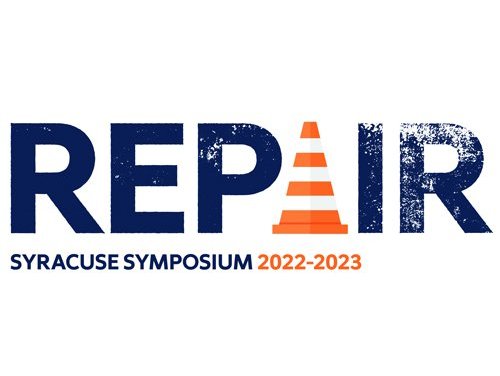Syracuse Symposium Addresses Timely Topics with Diverse Slate of Programming
19th annual Syracuse Symposium continues this spring semester with events centered around theme of “repair.”

Reparations for slavery. Environmental justice. Reproductive justice. Students, faculty, staff and the general public are invited to engage with these urgent topics and more throughout the spring semester thanks to the Syracuse University Humanities Center's Syracuse Symposium. The lineup of events, which includes film screenings, lectures, concerts, exhibits, workshops, and more, takes up this year’s Symposium theme of “repair.” Each program encourages participants to consider whether and when “repair” is possible, and how repair can help lead us to a more just world.
According to Vivian May, director of both the Humanities Center and Central New York Humanities Corridor, “repair” can take on many forms and meanings. For some, it might signify healing, mending or fixing on an intimate or personal level, while for others it can mean setting things right on a more structural level, to rectify historical wrongs. The spring semester’s diverse mix of events, featuring several community-engaged components, offers Syracuse University students, faculty and staff a range of opportunities to connect with and make an impact on the local community.
“Bridging scholarly inquiry with public impact, engaging wider communities in social justice matters and the public good, is at the core of what Syracuse University is all about—and certainly lies at the heart of Syracuse Symposium’s annual lineup,” observes May. She notes that “this year’s activities centered on ‘repair’ show how deeply the humanities are needed, in both educational and community settings, to confront complex questions of reparations, restitution, displacement, climate, and wellness in quite profound ways.”
This semester’s Syracuse Symposium events kick off with a two-day event featuring the Social Justice Sewing Academy (SJSA). Founded in 2017 by Sara Trail, SJSA is a platform where individuals utilize textile art for personal transformation and community cohesion and to begin the journey toward becoming an agent of social change. Trail, who learned to sew at the age of 4, is now a successful author, sewing teacher and pattern and fabric designer. On January 27 at 6 p.m. she will visit the Community Folk Art Center (CFAC) in Syracuse to present a program titled Active Repair: Works from the Social Justice Sewing Academy. Her event will highlight the SJSA project, its history and impact, with a focus on how textile arts can contribute to repairing societal injustices. (Continue reading full A&S article...)
